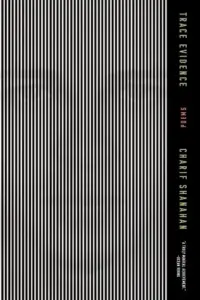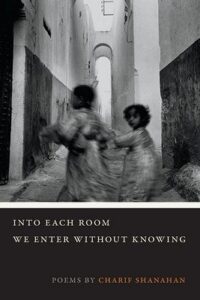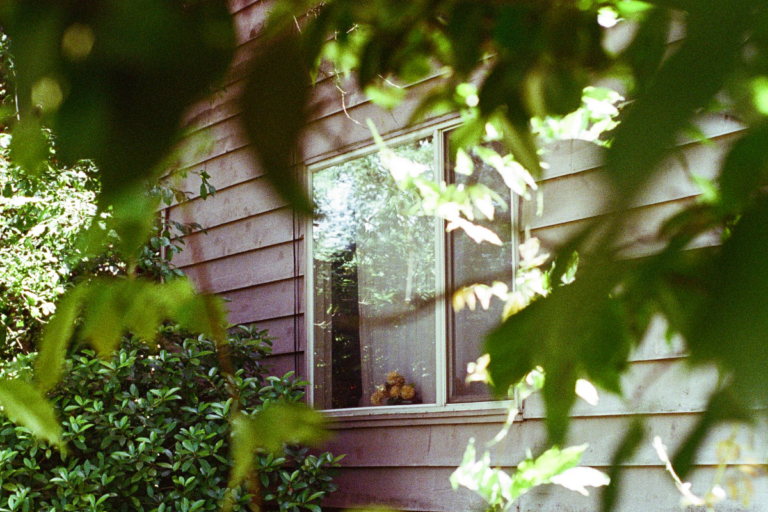Charif Shanahan
Present Moment
On one particular day, a poem places events alongside each other, the ordinariness of each event casting the other events into light and shade.
We’re pleased to offer Charif Shanahan’s poem, and invite you to connect with Poetry Unbound throughout this season.
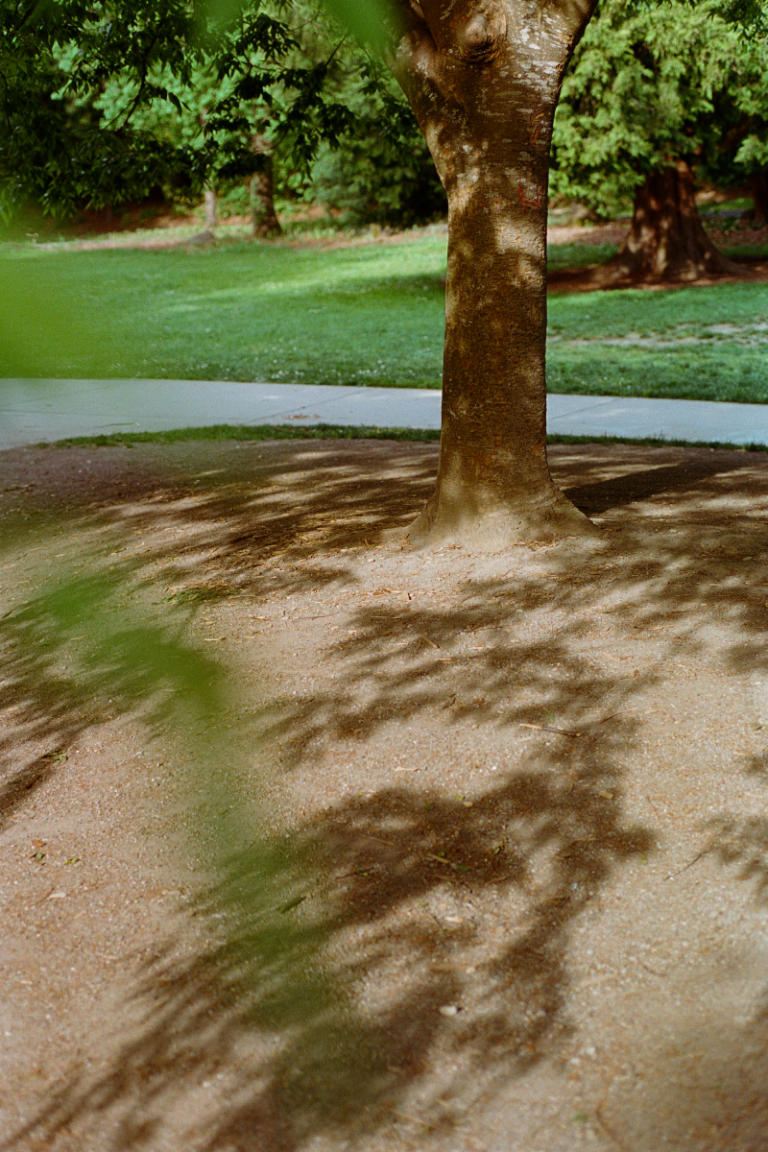
Image by Annisa Hale/ Film processed by Moody's Film Lab, © All Rights Reserved.
Guest
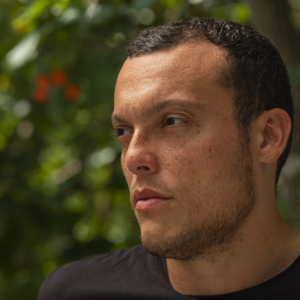
Charif Shanahan is the author of two collections of poetry: Trace Evidence: Poems (Tin House, 2023) and Into Each Room We Enter without Knowing (Crab Orchard Series in Poetry/SIU Press, 2017), which was a finalist for the Lambda Literary Award for Gay Poetry and the Publishing Triangle's Thom Gunn Award. His work has been supported by a National Endowment for the Arts Literature Fellowship; a Wallace Stegner Fellowship at Stanford University; and a Fulbright Senior Scholar Grant to Morocco. Originally from the Bronx, he is an Assistant Professor of English and Creative Writing at Northwestern University, where he teaches poetry in the undergraduate and Litowitz MFA+MA graduate creative writing programs. Image by Matt Eich.
Transcript
Transcription by Alletta Cooper
[music: “Praise the Rain” by Gautam Srikishan]
Pádraig Ó Tuama: My name is Pádraig Ó Tuama, and at the moment, I’m living in New York again. And the other day I was walking back to my apartment, and I saw a pigeon — a fairly ugly pigeon — flying down, picking up a small twig, and taking it away. I thought of that pigeon making a nest. There was just something so ordinary about it. Of course it’s going to see a twig and use it for its nest. There was nothing amazing about it. I didn’t come away going, “Oh, my God, spring’s coming.” But I noticed it, and I carried it with me for days. And I still think about it, and I wonder, where else did that pigeon find twigs from all around the city for the nest, and where is the nest? Small moments like that — it’s not about the transcendent breaking into things, it’s just about noticing something small, something forgettable. And somehow the things that stay with you that are small and forgettable can build up a little landscape of a day.
“Present Moment” by Charif Shanahan
“All day I think about what to do with the day.
I walk down the street for a coffee and to think
About what to do after that. On the table
Someone before me has left a little
Saucer of salt, with a wooden spoon
Like a tiny oar in white sand. In time I walk
Back to my apartment. When I turn the key
In the front gate, at the bottom of the steep staircase
Leading up to our door, my left eyelid twitches twice.
Inside I know there are things I want to do
With Monday: They levitate in the field of view
My mind makes, opening, like fireflies,
Or those old yellow lanterns along the perimeter of a yard.
My mother calls from New York: Tomorrow is
The last day of Ramadan and I should be sure
To call her, to say Eid Mubarak,
Which I will forget to do for at least two days.
I hang up and scroll through my camera roll:
One distant lover, then a second, then a third, then
A shadow passes over the window. San Francisco gray
On the backside of the building, where my windows face,
Though on the front side, moments earlier, the sun touched everything
Enough to heat it a little, to burn it a little.
An oar. My roommate’s dog licks my ankle and I
Dress for the gym, though I have no interest in staring at a wall
For 45 minutes while running suspended in the air
Beside all the gays I never could connect with
Despite my love of sex. I leave my apartment and go to the mall.
I buy two dress shirts and a pair of slacks, then leave,
Then go back in to buy a pair of gym shorts. In the bathroom
I know men who have shame, or like a rush, or both
Hawk the stalls looking for trade
Or stand at a urinal waiting
For something to happen, for someone to come
Take them away from themselves. I ride the escalator
Up and down. Am I really 35? What time is it?”
[music: “Ashed to Air” by Gautam Srikishan]
There’s a serious question about what is the present moment, because as soon as you’ve thought about the present moment, it’s past. And so, really, we dwell in history that’s just departed from us, as well as history that’s present with us from generations and centuries that we carry in us, as well as, then, the future, if the future exists or the possibility or the hope or the imagination of the future. So the present moment is continually evading us, and there seems to me to be something about somebody asking questions, at the age of 35, saying: Is this it? Is this really what it’s meant to be?
It seems to me like this is a day off. Certainly, there’s no talk about going to work. And so it does seem to me to be a day off: time for the gym, time to go for coffee, time to make a phone call, time to think about going to the gym, and time to go shopping. And also, then, going up and down in the escalator, and a certain kind of open-ended question about: What’s going on? Is this it? Who am I? What am I supposed to do? Is this normal for 35? What is the world supposed to give me? What am I supposed to give the world?
Whenever it’s my birthday, my father kind of announces to me what era of my life I’m in, and when I turned 47, he said to me, “I’d say now you’re absolutely, definitely in early-late forties.” I was like, “Thanks very much, Dad.” And I like those yearly reminders. And partly, when he says that to me, he’s reminding himself that he’s got a son who’s in his early-late forties. And I’m number three of six. So there’s others, too. I think he’s kind of trying to face himself while facing me.
And I can see in this poem that it’s somebody facing themselves: “I ride the escalator / Up and down. Am I really 35? What time is it?” Thirty-five, in terms of a vast span of age, it seems like, half of 70. And then: What time is it now? Time is doing so many different things in the poem. And always there’s this question in this poem about what’s happening right now, right this moment. What can I see in front of me? “My left eyelid twitches twice.” Paying attention to those small moments. Not to say they’re transcendent, but just to say they happened, a present moment, right here.
[music: “Creatures of Myth” by Gautam Srikishan]
The poem functions, in a certain sense, like a map of a day and a map of a person’s experience of a day, both the internal experience and the questions, as well as what they’re observing, as well as where they go. And there’s a lot of places mentioned in the poem: coffee place, the table, the walk back to the apartment and the gate, and the key to the gate, too, the steep staircase, then being inside the apartment, and then there’s a reference to New York, and the phone that connects. And memory, too, opens us up to another kind of place. And the place of the body, especially when the dog licks the ankle, and the place of the body in sex as well, because sex is a present experience of place in this poem. And in a way, sex is an experience of the present moment. But it’s far from him on this day. And so there seems to be this lament, going to the bathroom saying, this is a place where some people might hawk for sex. But then kind of saying, while he’s running suspended in the air, or resisting running suspended in the air around “all the gays I never could connect with / Despite my love of sex.”
The word there that strikes me in this really interesting line is “connect.” What does it mean to connect: with yourself, with other people, with what’s happening for you in your time and in your world right now, with your day off, with where you’re at in your life? All of these lines of the poem have underneath them this question about, what does it mean to connect?
[music: “At Dusk” by Gautam Srikishan]
I have been so struck each time I’ve read this poem about the oar, because it’s mentioned twice. Early at the start, “On the table / Someone before me has left a little / Saucer of salt, with a wooden spoon / Like a tiny oar in white sand.” Then later on when he’s speaking about the light, he says, “Moments earlier, the sun touched everything / Enough to heat it a little, to burn it a little. / An oar. My roommate’s dog licks my ankle and I / Dress for the gym,” and that sentence goes on and it builds and builds and builds on itself. It’s easy to forget what’s come beforehand, which is scrolling through a phone looking at one, two, three distant lovers, and “then / A shadow passes over the window,” almost like some kind of foreboding. He’s saying that he’s in San Francisco gray, even though just a moment before, the sunlight’s been out. Is this a hinge point at life? Is this somebody wondering: What’s time, and what am I in time, and what is it like for me to now be the age that I thought other people were at, and they were old, or too old, or they should have done this, or should have done that?
And then he mentions “an oar.” What is that oar? Is it an oar looking for its mate? Is it an oar that’s meant to be able to use you to in your vessel, get away from where you’re at? The oar is almost like some symbol to say: Get me out of here. Help me move on. And then, he’s thinking: What about “all the gays I never could connect with / Despite my love of sex”? Again, there’s this question about: Am I alone? Am I with somebody? Do I want to be? How is time working in me at this age of my life?
[music: “Every Place We’ve Been” by Gautam Srikishan]
I think this poem has a quiet poignancy to it, a gentle melancholy. It’s not devastating. It’s not a crisis. It’s also not saying, “Oh, here’s the present moment and the extraordinary bursts through the ordinary.” It’s just saying, “Here’s a day, which, in a certain sense, might be utterly forgettable.” Nothing surprising happens during the day, and he’s not trying to make anything surprising happen during the day. He’s paying attention to ordinariness. And I love that mood of the poem, therefore. There’s so many parts of our life that are just ordinary. If somebody said to you later on, “What’d you do this morning?” you might go, “God, I can’t remember. Nothing particular.” And what he’s done is he’s taken a day like that and listed them out and shown that this, too, is the stuff of poetry. What does it mean to be present in the moment, and how is it that you come to terms with yourself, whatever age you are, when you’re present at that moment, and whatever kind of ordinary, unremarkable day you might be having?
This isn’t an invitation to say, “The beautiful is happening everywhere.” It’s just an invitation to say, “Notice.”
[music: “Memoriam” by Gautam Srikishan]
“Present Moment” by Charif Shanahan
“All day I think about what to do with the day.
I walk down the street for a coffee and to think
About what to do after that. On the table
Someone before me has left a little
Saucer of salt, with a wooden spoon
Like a tiny oar in white sand. In time I walk
Back to my apartment. When I turn the key
In the front gate, at the bottom of the steep staircase
Leading up to our door, my left eyelid twitches twice.
Inside I know there are things I want to do
With Monday: They levitate in the field of view
My mind makes, opening, like fireflies,
Or those old yellow lanterns along the perimeter of a yard.
My mother calls from New York: Tomorrow is
The last day of Ramadan and I should be sure
To call her, to say Eid Mubarak,
Which I will forget to do for at least two days.
I hang up and scroll through my camera roll:
One distant lover, then a second, then a third, then
A shadow passes over the window. San Francisco gray
On the backside of the building, where my windows face,
Though on the front side, moments earlier, the sun touched everything
Enough to heat it a little, to burn it a little.
An oar. My roommate’s dog licks my ankle and I
Dress for the gym, though I have no interest in staring at a wall
For 45 minutes while running suspended in the air
Beside all the gays I never could connect with
Despite my love of sex. I leave my apartment and go to the mall.
I buy two dress shirts and a pair of slacks, then leave,
Then go back in to buy a pair of gym shorts. In the bathroom
I know men who have shame, or like a rush, or both
Hawk the stalls looking for trade
Or stand at a urinal waiting
For something to happen, for someone to come
Take them away from themselves. I ride the escalator
Up and down. Am I really 35? What time is it?”
[music: “Praise the Rain” by Gautam Srikishan]
Chris Heagle: “Present Moment” comes from Charif Shanahan’s book Trace Evidence. Thank you to Tin House Press who gave us permission to use Charif’s poem. Read it on our website at onbeing.org.
[music: “Praise the Rain” by Gautam Srikishan]
Poetry Unbound is: Gautam Srikishan, Eddie Gonzalez, Lilian Vo, Lucas Johnson, Amy Chatelaine, Kayla Edwards, and me, Chris Heagle.
Our music is composed and provided by Gautam Srikishan and Blue Dot Sessions.
This podcast is produced by On Being Studios, which is located on Dakota land. Open your world to poetry with us by subscribing to our Substack newsletter. You may also enjoy Pádraig’s new book, Poetry Unbound: 50 Poems to Open Your World. For links and to find out more visit poetryunbound.org.
Books & Music
Recommended Reading
The On Being Project is an affiliate partner of Bookshop.org and Amazon.com. Any earnings we receive through these affiliate partnerships go into directly supporting The On Being Project.





